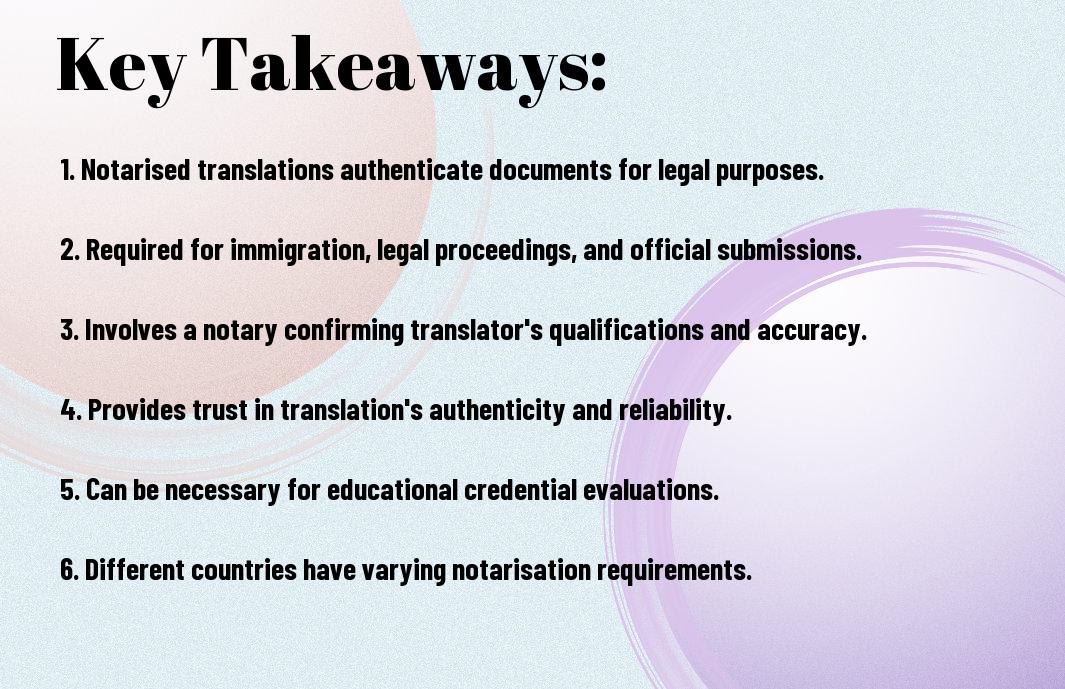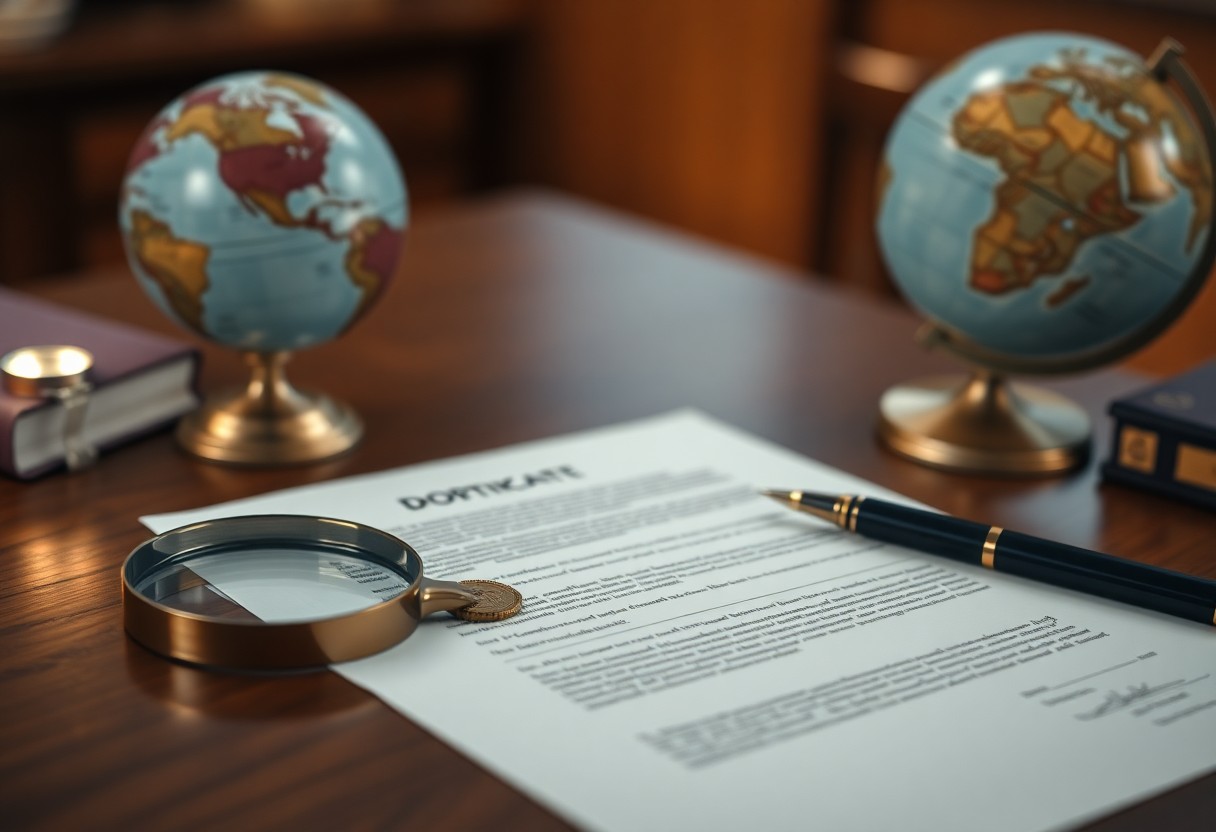It’s important to understand what notarised translations are and when they become necessary for your personal or professional needs. Notarised translations provide an added layer of authenticity to translated documents, often required for legal, immigration, or official purposes. In this post, you’ll learn about the specifics of notarised translations, their significance, and when you might need them. For more information, you can also explore what is the difference between notarized and certified ….
Key Takeaways:
- Definition: Notarised translations are official translations of documents that have been verified and certified by a notary public, ensuring their authenticity and accuracy.
- Legal Requirements: They are often required for legal documents, such as marriage certificates, birth certificates, and contracts, particularly when dealing with immigration or international transactions.
- Verification Process: The notarisation process adds a layer of credibility, confirming that the translator’s qualifications and the accuracy of the translation meet specific standards.
- When Needed: Notarised translations are generally needed when submitting documents to government agencies, courts, or when conducting business in a foreign country.
- Choosing a Service: It’s important to use a reputable translation service that can provide notarised translations, ensuring that all legal and linguistic criteria are met.
Definition of Notarised Translations
Your understanding of notarised translations is imperative when navigating various legal and official documents. A notarised translation is a document that has been translated and then verified by a notary public, who affirms the translator’s qualifications and the authenticity of the translation. This process adds a layer of credibility, ensuring that the translated documents are recognized by authorities and institutions.
What Constitutes a Notarised Translation
Translations that qualify as notarised translations must be accompanied by a notarization, which includes the notary’s signature and seal. The notary confirms that the translator is competent and that the translation accurately reflects the original document’s content. This process typically involves the translator signing a declaration before the notary, ensuring the translation’s legitimacy and compliance with local laws.
Differences Between Notarised and Certified Translations
Between notarised and certified translations, the main distinction lies in their authentication process and usage. Certified translations are usually accompanied by a signed statement from the translator attesting to the accuracy of the translation, but they do not require notarization. Notarised translations, however, involve a notary public who confirms the translator’s qualifications, adding an extra layer of assurance.
Understanding these differences can help you choose the right type of translation for your needs. Notarised translations provide a more formal verification process and are often required for legal documents, while certified translations may suffice for other purposes requiring official recognition. Be aware of the specific requirements of the institutions or authorities you are dealing with, as they may specify the type of translation document you need.
Legal Framework Surrounding Notarised Translations
If you’re dealing with official documents in a foreign language, understanding the legal framework surrounding notarised translations is vital. These translations often serve as legal evidence in various jurisdictions and can be required for visas, immigration, and court cases. Knowing the legal requirements specific to your context can prevent delays and complications.
Jurisdictions and Their Requirements
Jurisdictions vary widely in their requirements for notarised translations. While some may require a notarised translation for all official documents, others might only have this stipulation for specific types, such as legal or immigration documents. It’s important for you to research the specific rules applicable to your location or the location where your documents will be used.
Significance in Legal Proceedings
On a procedural level, notarised translations hold significant importance in legal proceedings. They ensure that non-native speakers can understand legal documents, thereby facilitating fairness in judicial processes. By having your documents translated and notarised, you can maintain transparency and compliance with legal standards enforced in various jurisdictions.
Even a slight misunderstanding due to translation errors can jeopardize the outcome of a legal proceeding. Notarised translations provide an added layer of authentication, ensuring the accuracy of the content. This is especially vital if you are involved in court cases, immigration applications, or any legal matters where language differences may create barriers. A properly notarised translation can solidify your position and help safeguard your rights in legal contexts.
When Are Notarised Translations Necessary?
Many situations call for notarised translations to ensure legal validity and authenticity. You may need a notarised translation when presenting documents to government agencies, educational institutions, or during legal proceedings. This type of translation guarantees that your documents are accurately translated and recognised by official entities, which can help prevent issues associated with misinformation or misinterpretation.
Common Scenarios Requiring Notarised Translations
Common scenarios where notarised translations are necessary include submitting academic records for university applications, legal documents for court cases, and paperwork related to property transactions. If you’re moving abroad or applying for residency, you might also need to notarise your marriage certificate, birth certificate, or other vital documents. Ensuring these translations are notarised helps avoid delays or complications in your processes.
Impact on Immigration and Passport Applications
Immigration processes often require notarised translations of your personal documents. Authorities demand official and accurate translations of crucial paperwork, such as birth certificates, marriage licenses, and police clearance reports, to verify your identity and background during your application process.
Further, failure to provide notarised translations can lead to prolonged application times or, in some cases, outright rejection of your immigration or passport applications. Ensuring that all your documents are properly translated and notarised demonstrates your commitment to complying with official requirements and can significantly smooth your journey through the application process.
The Process of Obtaining a Notarised Translation
To obtain a notarised translation, you must ensure that both translation and notarisation processes are correctly followed. This usually involves engaging a professional translator who specializes in the required language pair and the subject matter. After the translation is completed, a licensed notary public will confirm the translator’s identity and authenticity of the document. By understanding these steps, you can streamline the process for your documents.
Steps Involved
To navigate the steps to obtain a notarised translation, start by identifying the document that requires translation. Next, select a qualified translator who has expertise in both the source and target languages. After the translation is completed, take the document to a notary public, who will authenticate it, ensuring that both the translation and the translator’s credentials are valid.
Selecting a Qualified Translator and Notary
About choosing a qualified translator and notary, you should look for professionals who specialize in your subject area and are familiar with the specific requirements for notarisation. Check their credentials and reviews to ensure they meet your standards. It is vital that the translator is proficient in the languages involved, as well as knowledgeable about the document type you need translated.
Process of selecting the right translator and notary involves researching and validating their qualifications. It’s advisable to seek recommendations, check certifications, and ensure the translator has experience with notarised translations. For the notary, confirm their commission and reputation in the community. Taking these steps helps ensure you receive accurate translations and reliable notarisation for your documents.
Cost Considerations for Notarised Translations
Despite the importance of notarised translations, their costs can vary significantly. Understanding these cost factors can help you better prepare your budget and avoid surprises. Translators may charge different rates based on various aspects of your project, including complexity, length, and urgency. As such, it is vital to consider the following:
- Language pair and rarity
- Document complexity and subject matter
- Deadline and turnaround time
- Additional service requirements
Assume that investing in quality notarised translations will not only ensure accuracy but may save you from future complications.
Budgeting for Translation Services
Below, you’ll find some tips on budgeting for your notarised translation needs. It’s important to account for the total costs beyond just the translation itself, including any notarisation fees. Accurate budgeting will allow you to have a smoother experience by avoiding unexpected expenses.
Translations come with a range of potential expenses, making it vital to plan ahead. By determining the scope of your translation project, you can better estimate the total costs, which may involve multiple factors like document formatting and certification requirements. Don’t forget to ask your service provider for a detailed quote that breaks down each cost component, ensuring transparency and allowing you to make informed financial decisions. Additionally, budgeting for potential revisions or changes can safeguard against unforeseen expenses.
Final Words
With these considerations in mind, you can better understand what notarised translations are and when they are necessary. These translations serve as official documents, providing assurance of accuracy and authenticity for legal, immigration, or business purposes. Knowing when to seek a notarised translation can save you time and potential complications in your processes, ensuring your documents are recognized and accepted where needed. Stay informed about your requirements and make well-informed decisions to facilitate your interactions in a global environment.
FAQ
Q: What are notarised translations?
A: Notarised translations are official translations that are accompanied by a notarization. This means that a certified translator provides a translation of a document and then has it notarized by a licensed notary public. The notary public verifies the identity of the translator and confirms that the translation is a true and accurate representation of the original document. This process adds a layer of authenticity and can be required for documents used in legal, immigration, or administrative proceedings.
Q: When are notarised translations needed?
A: Notarised translations are often required for legal documents, such as contracts, birth certificates, marriage licenses, divorce decrees, and academic records. They may also be necessary for immigration paperwork, court filings, and other official dealings where accuracy and authenticity of the translation may be questioned. It is advisable to verify specific requirements with the institution or authority requesting the translated documents, as they can vary by jurisdiction.
Q: How do I obtain a notarised translation?
A: To obtain a notarised translation, start by locating a certified translator who is proficient in the source and target languages of your document. Once the translation is completed, the translator will need to have their work notarized. This usually involves making an appointment with a notary public, presenting the translated document along with the original document for verification. The notary will then complete a certificate indicating that the translation was performed by a qualified individual and that the notary verified their identity. Some translation services may also offer both translation and notarization in one package, which can streamline the process.


